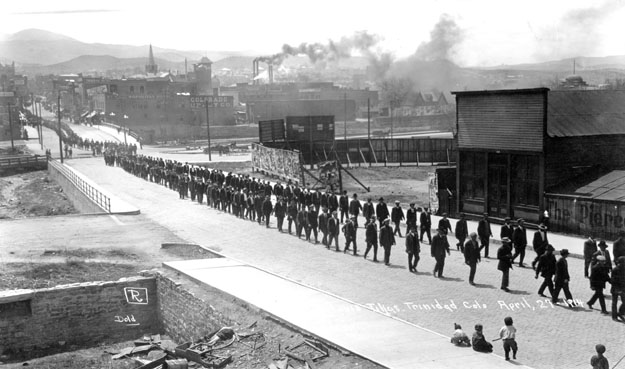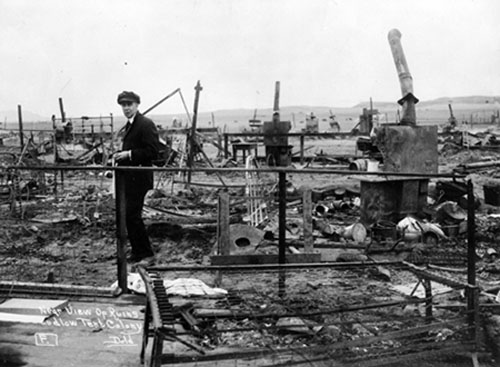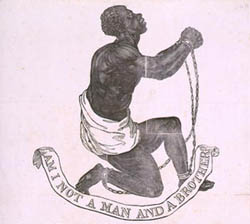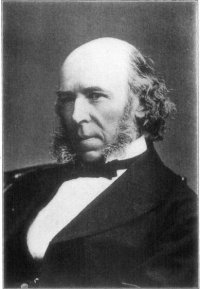The Ludlow Massacre

John D. Rockefeller, Jr., speaking to assembled Colorado miners, September 20, 1915.
We are all partners in a way. Capital can’t get along without you men, and you men can’t get along without capital. When anybody comes along and tells you that capital and labor can’t get along together that man is your worst enemy. We are getting along friendly enough here in this mine right now, and there is no reason why you men cannot get along with the managers of my company when I am back in New York.
John D. Rockefeller, Jr., June 10, 1914.
There was no Ludlow massacre. The engagement started as a desperate fight for life by two small squads of militia against the entire tent colony ... There were no women or children shot by the authorities of the State or representatives of the operators ... While this loss of life is profoundly to be regretted, it is unjust in the extreme to lay it at the door of the defenders of law and property, who were in no slightest way responsible for it.
From the New York World. Reprinted in Walter H. Fink, The Ludlow Massacre (1914), 7–21.
On the day of the Ludlow battle a chum and myself left the house of the Rev. J. O. Ferris, the Episcopal minister with whom I boarded in Trinidad, for a long tramp through the hills. We walked fourteen miles, intending to take the Colorado & Southern Railway back to Trinidad from Ludlow station.
We were going down a trail on the mountain side above the tent city at Ludlow when my chum pulled my sleeve and at the same instant we heard shooting. The militia were coming out of Hastings Canyon and firing as they came. We lay flat behind a rock and after a few minutes I raised my hat aloft on a stick. Instantly bullets came in our direction. One penetrated my hat. The militiamen must have been watching the hillside through glasses and thought my old hat betrayed the whereabouts of a sharpshooter of the miners.
Then came the killing of Louis Tikas, the Greek leader of the strikers. We saw the militiamen parley outside the tent city, and, a few minutes later, Tikas came out to meet them. We watched them talking. Suddenly an officer raised his rifle, gripping the barrel, and felled Tikas with the butt.
Tikas fell face downward. As he lay there we saw the militiamen fall back. Then they aimed their rifles and deliberately fired them into the unconscious man's body. It was the first murder I had ever seen, for it was a murder and nothing less. Then the miners ran about in the tent colony and women and children scuttled for safety in the pits which afterward trapped them.
We watched from our rock shelter while the militia dragged up their machine guns and poured a murderous fire into the arroyo from a height by Water Tank Hill above the Ludlow depot. Then came the firing of the tents.
I am positive that by no possible chance could they have been set ablaze accidentally. The militiamen were thick about the northwest corner of the colony where the fire started and we could see distinctly from our lofty observation place what looked like a blazing torch waved in the midst of militia a few seconds before the general conflagration swept through the place. What followed everybody knows.
Sickened by what we had seen, we took a freight back into Trinidad.

New York Times, April 21, 1914.
The Ludlow camp is a mass of charred debris, and buried beneath it is a story of horror imparalleled in the history of industrial warfare. In the holes which had been dug for their protection against the rifles’ fire the women and children died like trapped rats when the flames swept over them. One pit, uncovered [the day after the massacre] disclosed the bodies of ten children and two women.
Fellow Workers,
Today is the 94th anniversary of the Ludlow massacre–April 20th, 1914. The United Mine Workers of America led a massive strike in Rockefeller’s Colorado coal mines from 1913 to 1914, demanding an eight hour day, an increase in wages, the removal of company-hired guards from the coal pits, and freedom for workers to arrange for their own housing, choose their own doctor, and receive pay in cash instead of company scrip. Tens of thousands of workers — over 90% of the miners in the coal-pits — went on strike. When the miners went on strike, they lost everything, because they all had to live in company towns, with company landlords. They lost their money; they couldn’t shop at the stores; and they were thrown out of their homes. So they set up shanty-towns on land that the union leased for them, and lived in tents high in the hills through the long winter months of a bitter strike. The company hired guards from private detective agencies, and they got the governor to call up the Colorado National Guard on their behalf. On April 20th, the National Guard and the company thugs pretended to negotiate with Louis Tikas while setting up machine-guns in the high-points around the camps. They fired down into shanty-town and, after many of the strikers dug into the ground for cover, they torched the tents. By the end of the night 45 people were dead–32 of them women and children–shot, smothered, or burned alive. They were murdered by company death squads and by agents of the State, in order to defend John D. Rockefeller Jr.’s laws and his legally-fabricated claims to property that he never worked, and had barely ever seen.
Howard Zinn, Declarations of Independence.
As I read about this, I wondered why this extraordinary event, so full of drama, so peopled by remarkable personalities, was never mentioned in the history books. Why was this strike, which cast a dark shadow on the Rockefeller interests and on corporate America generally, considered less important than the building by John D. Rockefeller of the Standard Oil Company, which was looked on as an important and positive event in the development of American industry?
I knew there was no secret meeting of industrialists and historians to agree to emphasize the admirable achievements of the great corporations and ignore the bloody costs of industrialization in America. But I concluded that a certain unspoken understanding lay beneath the writing of textbooks and the teaching of history: that it would be considered bold, radical, perhaps even
communistto emphasize class struggle in the United States, a country where the dominant ideology emphasized the oneness of the nationWe the People, in order to…etc., etc.and the glories of the American system.
An anonymous proletarian.
First printed by the Industrial Workers of the World in 1908.
We have fed you all for a thousand years
And you hail us still unfed
Though there’s never a dollar of all your wealth
But marks the workers dead
We have yielded our best to give you rest
And you lie on crimson wool
But if blood be the price of all your wealth
Good God we have paid in fullThere is never a mine blown skyward now
But we’re buried alive for you
There’s never a wreck drifts shoreward now
But we are its ghastly crew
Go reckon our dead by the forges red
And the factories where we spin
If blood be the price of your cursèd wealth
Good God we have paid it inWe have fed you all for a thousand years
For that was our doom, you know
From the days when you chained us in your fields
To the strike a week ago
You have taken our lives, and our husbands and wives
And we’re told it’s your legal share
But if blood be the price of your lawful wealth
Good God we bought it fair.


